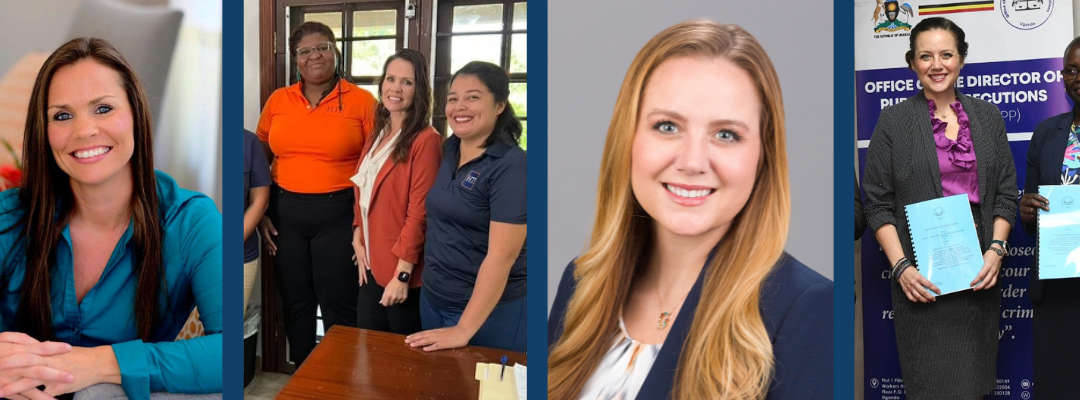The Human Trafficking Institute recently partnered with Uganda’s National Police Human Trafficking Department to train 32 members of its Trafficking in Persons (TIP) Department and detectives from border posts around Uganda. This two-day training was held on February 20, at the Criminal Investigations Directorate (CID) at Kibuli in Kampala, Uganda.
The training was part of the Institute’s ongoing formal relationship with the Uganda Police Force, specifically, the Criminal Investigations Division where the TIP investigators are assigned. The purpose of this training was to provide TIP investigators with additional skills in proactive and reactive human trafficking investigations, both for domestic and transnational cases, equipping them with the knowledge and abilities to develop better investigations and cases.
“Because human trafficking cases are often very complicated and difficult to investigate, specialized training is important,” said Tyler Dunman, Institute Special Counsel in Uganda, who co-facilitated the training. “We have to expand their knowledge, skills, and expertise beyond what they do in non-human trafficking-related investigations. There are certain investigative techniques and approaches to evidence collection that can make or break a human trafficking case, so the TIP investigator must be familiar with these concepts to be successful in building their case against the trafficker.”
The training curriculum was a collaboration among experts and organizations who shared best practices in the investigations process. Rachel Bikhole, Assistant Director of Public Prosecutions in Uganda, provided training on differences between human trafficking and smuggling cases. Harriette Kebirungi, a Principle Immigration Officer in Uganda, discussed human trafficking issues at Ugandan border points. The Institute’s Dave Rogers, Director of Law Enforcement Operations, and Tyler Dunman reemphasized the importance of prosecutor-led investigative techniques to the TIP investigators, increasing the confidence and ability of those investigators to initiate and to complete investigations.
Willow International, a civil society organization that provides victim services to trafficking survivors, brought case managers to offer perspectives on working with trafficking survivors, which was followed by a panel discussion facilitated by the Institute’s Director of Victim Services Marie Martinez Israelite. Israelite also led a session on trauma-informed and victim-centered approaches to human trafficking investigations. Willow’s Monica Kyzamazima, Legal Programs Director, provided an overview of the organization’s partnership with the police for human trafficking cases and the referral process.
Following the training, CID leadership will conduct regular check-ins with the attendees in order to assess what they learned and how they are applying the training techniques to their cases. The Uganda Police Force is actively working towards effective human trafficking investigative abilities and will continue to partner with the Institute. In 2019, the Institute entered into a formal Memorandum of Understanding with the Uganda Police Force to provide ongoing law enforcement human trafficking investigations training, embedded expertise, and relevant resources needed to be effective.
“If the investigators are applying their newly acquired skills effectively, their investigations will be more complete and thorough, which will lead to more effective prosecutions,” Rogers said. “The supervisors of these officers will be following up and tracking their performance, and the TIP prosecutors will also provide feedback to the investigators on their effectiveness.”
At the close of the February training, Joseph Obwona, Deputy Director of the Uganda Police Force’s Directorate of Criminal Investigation and Crime Intelligence, said, “We started engaging with the Human Trafficking Institute two years ago. We must commend them for their help in building our capacity in addressing human trafficking and put to good use the training we have benefitted from this week. Now that you have this training; no more excuses. You have a lot to do. [Human trafficking] is a very big problem. We must see more detection, resulting in more arrests, rescues of victims, and successful prosecution of the culprits.”
These types of trainings for law enforcement are critical to the Institute’s ongoing work in Uganda by providing specialized human trafficking investigation training to the specialized police investigators, increasing their abilities to identify and build solid human trafficking cases. With complete and comprehensive investigations, the specialized TIP prosecutors can successfully prosecute the traffickers in court. If the underlying investigations by police are incomplete, prosecutors are often forced to reduce charges or even dismiss the case.
“A complete human trafficking investigation is the bedrock for a successful human trafficking prosecution – the two go hand in hand. And, with an increase in human trafficking convictions, we can ultimately stop traffickers and rescue more victims,” Dunman said.
To build on this training, the Institute is planning a week-long Academy in July to provide police officers and prosecutors with additional experience in human trafficking investigations and prosecutions. During this Academy, police and prosecutors will work together – from start to finish – in a real-life, hypothetical human trafficking case scenario. Their performance will be evaluated, and they will receive feedback on their abilities as well as ways to improve.




